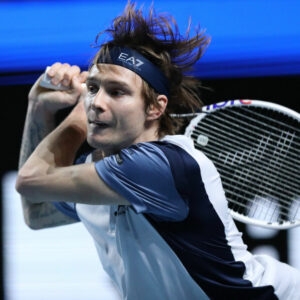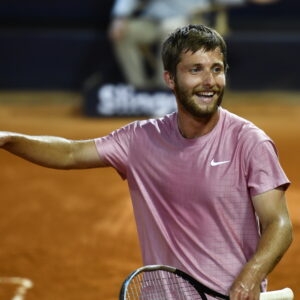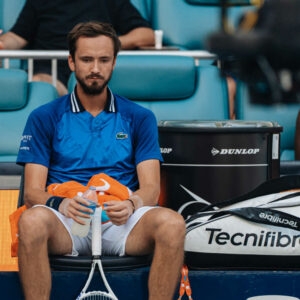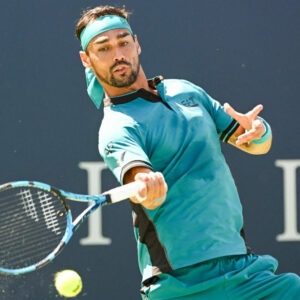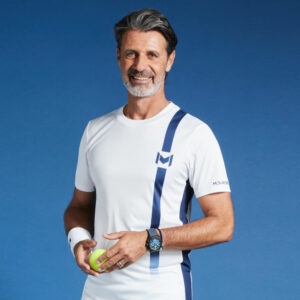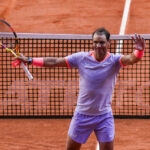“The fans have to feel like ‘Wow! I have emotions, I’m excited'”: Mouratoglou on UTS4 and the future of tennis
In an in-depth interview Patrick Mouratoglou breaks down the format changes coming to UTS4 and discusses how his competition can help the sport learn more about it how to reach its next generation of fans.
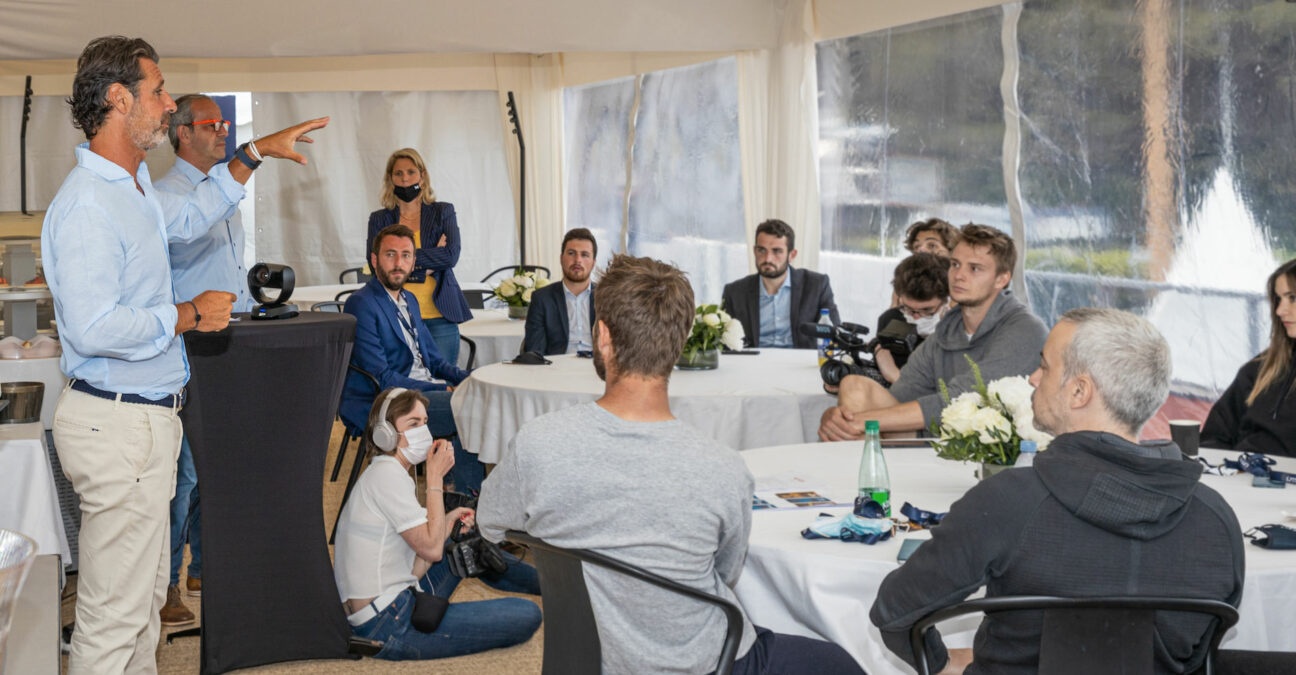 © UTS
© UTS
Patrick Mouratoglou, what is new for Season 2 of UTS?
Very nice things. You’ll be surprised, positively. We want to make this show more and more exciting, so we decided to get rid of the first serve, because our feeling is that we don’t want too many aces and service winners. It’s a bit boring. We want to have rallies and fun, so that’s why we get rid of it.
We also decided to have a shorter net, not lower, but shorter, so we can encourage hot shots on the sides of it. We’ve seen that a few times in tennis, but it’s extremely rare. By having the net exactly on the lines, we give players this opportunity.
And coaching, any changes there?
In the past coaching was about hitting the buzzer for the coach and he had 30 seconds to talk to his player during a “coaching timeout.” We want to have coaching all the time, because you know there is time between the points and we found out that in classical tennis that time between the points, the time when the ball is not in play, represents between 80 and 90 percent of the time, which is unbelievable. We thought that if the downtime in tennis can be exciting, it can be fun. It can be interesting, immersive – and that’s great.
So between the points the coaches will be on the court and they will be allowed to coach between every point. In classical tennis, nothing happens during that time. People are doing their routines. In UTS it is coaching moments, so the coach will be on the court sitting on the bench and he will be allowed to talk to his player between every point, giving directions. We want an immersive experience and thanks to that we will understand exactly what are the strategies of the coaches with their players.
You seem to enjoy taking apart the rulebook and making it your own?
I love to break rules. We’re kind of a laboratory. We are creating the tennis that is the most exciting for the younger generations and we are trying new things that we think make sense. I have always been a rule breaker, but don’t say that I am. I don’t do it to be annoying, I do it because I think that if tennis wants to seduce the younger generation, it has to be different from classical tennis. So we look at what the younger generations like, what they consume, and we create a product that of course has to do with tennis, but it looks like the type of product that they like and that they want to consume.
How do you think players will approach only having one serve?
That’s a very good question. I think there are two types of players: players who count on this serve a lot, and players who consider that their service is not an asset. Those ones will be extremely happy. You have only one serve, but they don’t mind. They just put the ball in play and then they start running, right? Then you have the players who really depend a lot on their serves, and of course for them it is more difficult, but I think it’s great for them because it’s going to make them work a lot on the ground strokes. It is going to push them to be better at what they are not the best at and it is going to be also a good experience to improve.
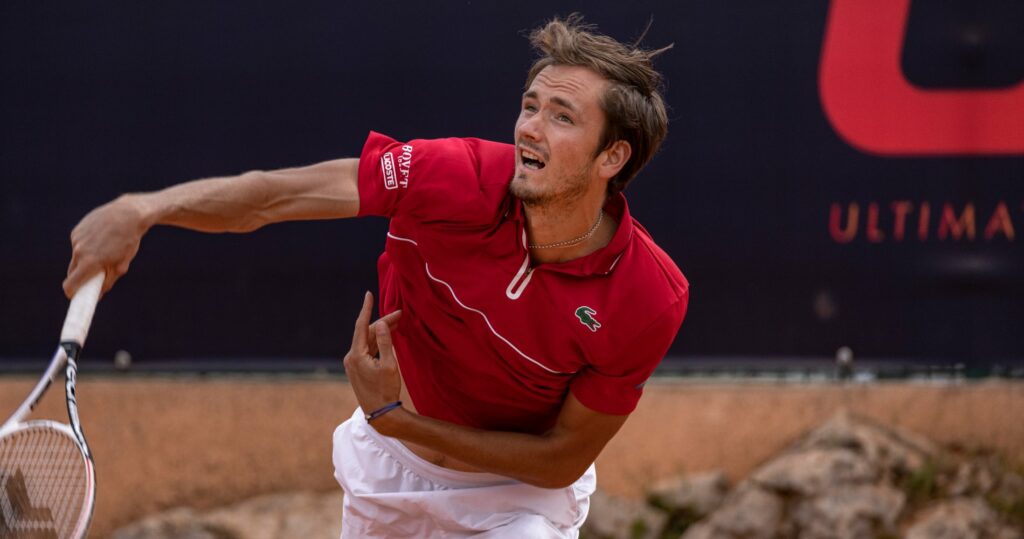
As coaches we always do stuff like that during practice sessions. We create situations in which we tell them they have only one serve or they have to serve and volley, or if they hit a winner they get extra points. It’s a way to push them to do stuff they don’t do the rest of the time when they have known to play a normal match. And it helps them work on some stuff in their game, so that’s exactly the idea of the cards. We came out with this card idea, coming from the situations that we create during the practice sessions.
In terms of the viewership, we’re going to have traditional fans and we’re going to have brand-new fans. What would you say the message is to traditional fans who may be a little bit critical of Ultimate Tennis Showdown?
You can’t please everyone. The idea is definitely to bring new fans on board, to grow the pie for tennis. As we know, tennis is incredibly popular with people over 40 years old. People like me love tennis, but under 40 years old, you don’t have many tennis fans. The idea is simply to propose to them a product that is different, to make sure that they like it and they get hooked, then they start to like tennis in general, because tennis is a big family.
So to answer your question about the traditional tennis fans: a lot of them are very conservative so maybe they won’t like it. But the idea is one thing, the experience is another thing. You have practice, so I hope they’re going to watch, I’m sure that if they watch they are going to like it because it’s still tennis and there are a lot of things that they have never seen and maybe they’re going to like both for different reasons.
All those people that don’t watch tennis, why don’t we go and get them? Bring them on board!
Patrick Mouratoglou
You talk about the big family, but is there a concern for some that UTS may kill tennis?
We’re million miles away from killing tennis, of course, but some people might see UTS as a threat for tennis. I think it’s the exact opposite. I mean, a fan of tennis like me and all those guys that are over 40 years old, and our tennis fans, they’re still gonna love tennis forever. When you fall in love with it, with tennis, it’s for life, but on the other hand, all those people that don’t watch tennis, why don’t we go and get them? Bring them on board! I think it is the same cake. For all tennis, whether it’s ATP, WTA, Grand Slams, juniors or UTS. This pie has to grow.
We have to bring new fans on board first, for the long term. And second, because the more there are [for] tennis, the better it is going to be for everyone. UTS is not against it. It’s a plus. It’s younger generation and older generation, there is a product for everybody. The bigger the cake the better, we agree with that one. We agree with that.
You have not coached yet in UTS. But what do you think your favourite card would be if you did?
There are two types of cards for me. There are cards that give an extra chance, and there are cards that give a huge advantage, but put a lot of pressure at the same time. You have to make sure that your player can deal with that pressure. Like for example if I hit a winner I have three points, instead of one; I mean, it’s a great plus, but at the same time, what kind of pressure it is to go for the winner, when you are forced to go for the winner?
It’s not like I have the ball to go for the winner, it’s a completely different mindset and you have to know your player well enough to see what’s the best card for your player, one that they are able to to handle, because otherwise it’s useless. It can even lead to an unforced error, so it’s even worse. I would say it’s very player-driven. Who is my player? What does he like to do, and how does he handle that type of pressure?
Corentin Moutet‘s racquet-smashing aside, what’s been the most surprising reaction from a player about UTS that you have received?
First of all, I was impressed by the fact that it was studied so much. All the codes, all the rules, the rulebook. They wanted to understand them perfectly and take the most out of every rule. They understood that it was also a very tactical game and that the rules could give you a big plus, so they were going with incredible ideas like ‘Oh, but if I do this at that time, this is going to be an advantage’, and things that we didn’t even think about. So that was really incredible and I was also impressed by the fact that some of them really loved it and told me, ‘Oh,I can come with you to the ATP to advocate for you for UTS?’, which I didn’t ask for or anything, but I thought, ‘Wow, that’s great’.
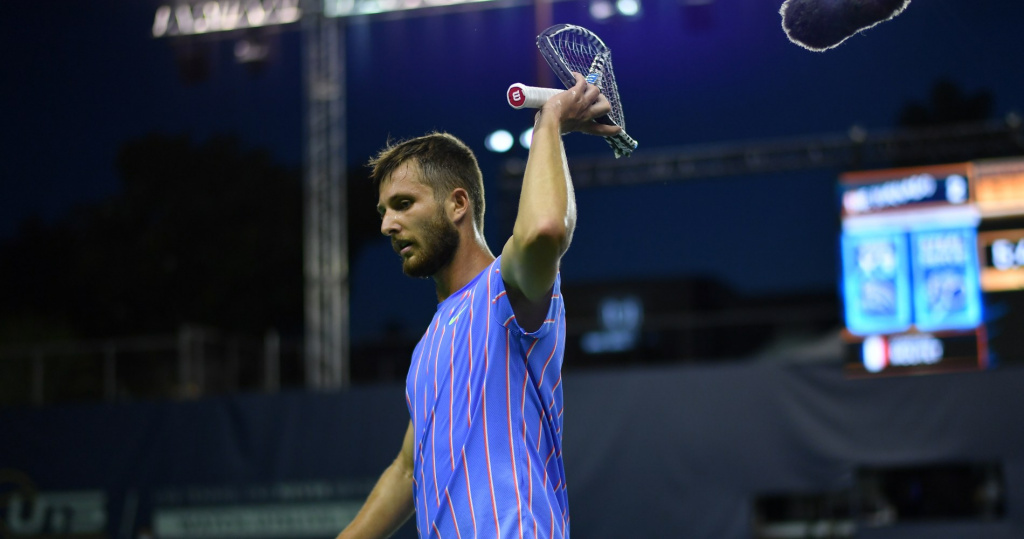
It just shows how much they like it. I’m very happy with the fact that players embrace it, they feel it is theirs also, they understand the interest of having a format for the younger generations and for non tennis fans, to bring them on board, and they’re excited with it and they want to play and they want to play again and some guys call every time: ‘Can I play? I never played it, but I want to play!’ So now it’s really fun and it’s a great experience for all of us, I think.
So can I just ask one more question, it’s really important… How many racquets do you think Corentin Moutet is going to break this week?
If I was his coach, I would hope for zero, but as I’m Patrick Mouratoglou, 20 is a good number.
You touched on the younger generation there. That’s something that I know that you pioneer about Ultimate Tennis Showdown. Why is it so important for you to have a younger generation watching tennis and specifically through the channels of Ultimate Tennis Showdown?
So we want to have the new generation for many reasons. First reason is because they’re young, so they’re going to be fans for 40, 50, 60 years. This is the future, the younger generations. I think it’s very important for any sport to be able to renew its fan base. A sport that is not renewing its fan base is a sport that’s going to die. I don’t know if people realise that. I know it’s not very nice to say it. I know a lot of people get angry when I say it, but it’s a fact.
We know that classical tennis will not be the way in the future.
Patrick Mouratoglou
Does it worry you?
Yeah, of course I’m worried. I’m worried about tennis. I love tennis. I dedicated my life to tennis. Since I was four years old I have dedicated all my life to tennis. You won’t find someone who’s more of a tennis fan than me. So yes, I’m worried when I see that the average age of the tennis fan is 61. When I see that nobody – almost nobody – under 40 years old watches tennis and even the players when I speak to the players. And I spoke to all of the guys. I didn’t hear one guy telling me they are watching tennis matches. They all tell me, ‘We never watch a tennis match’. Why? ‘Because it’s too long. We watch highlights. We watch samples.’ So what about people who are not into tennis? No chance. So I think it’s a great challenge and we have to take it on because I think the future of our sport is on the line.
In a way we’re showing a way and if it works I’m sure that after that the ATP and the WTA will think: ‘Oh wow, this works’. Maybe they won’t do it in the near future, because they also don’t want to disappoint the traditional fans, but we show a way for the future. We need to see a way. We don’t see it for the moment because we know that classical tennis will not be the way in the future. It’s a way for the present. It was a fantastic way in the past. For the future, clearly not. So what is the way? Someone has to show. I’m not saying that I show… I say I created something and we’re going to implement it. We’re going to experiment with it. We create a real-time laboratory in which we’re going to fine-tune a perfect format to feed what the young generations like and consume, so that’s what we want.
Speaking of the younger generation, Patrick, you’ve now amassed over 2000 posts on Instagram. I know how busy you are at UTS and in this Academy. So how do you keep up with it all?
First I have a big team, a great team. They’re doing most of the posts, but of course it’s about the experiences that I live. I just have people with me filming what I do every day, even though I’m on the court whether there is a camera or not. But we found out that when there is a camera and we can capture some coaching moments, people like it because they feel like it helps them for their tennis because they get tips. So that’s the type of thing we do and we decided to do more and more because I think it’s a great way to connect with the tennis fans, the people who are into tennis, the people who love tennis, the people who play tennis.
I mean, those social medias exist, and if they exist it is for a reason. If people love it so much it is because it’s matching a need and we as people who are trying to connect with the tennis fans, I think it’s a great tool to use. It’s definitely a priority for us.
Youngsters will call you an influencer…
That’s the term they use. I kind of like it.
Do the younger players you have here at the Mouratoglou Academy practise the UTS format?
Yeah, they practise the format. First of all, we’ve created an app because a lot of people reached out to me after the first UTS series, telling me, ‘Oh I’m the owner of a tennis club,’ or ‘I’m the coach of a tennis club, and the kids play UTS’, And I thought, ‘Wow, that’s amazing. So why don’t we create a tool for them?’ And when you think about it, when you’re in a tennis club and you book to play, you have either 45 minutes or an hour. It’s exactly the time that UTS lasts, you have no time to play a full match, no chance in that amount of time.
We created an app for people in any club in the world when they have 45 minutes or an hour to be able to play a full UTS match. And thanks to the app they have the countdown of the time, they can enter the score. They have the cards so they see the cards so it’s like the big screen that we have during a professional UTS match, but on a smaller version. And also we created sounds, so they also hear the time and stuff like that. That was the first thing we’ve done, and I think it’s a great idea what we decided at Mouratoglou Academy is to set up UTS matches every week now as a competition, because we know that the kids love it. They know they want to participate in that. So this is something that is planned for the next two weeks and months.
You’re talking about how UTS is evolving. It’s very new still. Where do you see it in a couple of years time? Where do you want to go?
I think we’re getting closer and closer to the ideal format, but again, I’m nobody to answer that. The only people that can answer that is the fans. So we do a lot of surveys. We observe what they like, what they don’t like. Of course, we get a lot of feedback. We get a lot of feedback also from the players. I also asked for feedback from the TV channels, because they have a lot of experience about how fans consume. For me, and I speak also to people from the tennis industry and I tell them: ‘Listen, it is something we have to build together.’ It’s our future. That’s what we hope, because if we’re not able to bring new fans on board and we’re all in trouble, and we all know that.
It’s something we have to build together, but it’s fan-centred. The fans have to feel like, ‘Wow! I have emotions, I’m excited. I’m jumping out of my couch every 20 seconds.’ This is what we want and so I see it that way. I want more fan engagement. That’s definitely something we need to do a lot of progress on. We’re working on a lot of areas at the same time too, because we start to have quite a very clear idea of the final product. You will see also that the music, and mixed media, all this has to add to the drama. I see it as a movie. You know, it’s like a movie, we just don’t know what’s going to happen at the end.
We’ve got an incredible lineup of eight players this time around, two top-tenners, but I really want to know, has Daniil Medvedev made up with the clay surface? Is he friends again?
That’s great, you see. We didn’t start and we already have a great question to ask, and he’s going to give the answer by playing. I think he doesn’t like it, but I think he knows he has to learn and he probably identified with his team and his coach why he feels in trouble on the surface and what he needs to work on. He is probably working on it every day and for him definitely match experience, even though it’s not a classical tennis match, it is going to be very useful. The fact that the serve is less important at UTS, it is going to help him play more rallies, so I see it as something positive for him because I feel that it’s in the rallies that he has to find his feel.
How to move? How to handle the rallies? How to shorten the rallies? You know, for all those players who are not specialists of clay or don’t feel comfortable on it, the main thing is about how to do what they do well, how to adapt it to the clay. If you try to change your game, you’re done, but I think he is not going to try to change his game at all. I think he is just going to try to do what he does perfectly on hard and bring it to clay, and maybe do it even better on clay. Increase what he does well, because he will have to, but it’s exciting, you know, to have No 2 in the world feeling uncomfortable on clay, in a new format. Playing some of the best clay specialists also, because we have some, it’s going to be exciting to watch.
And also let’s not forget it’s very close to Roland-Garros, to have the world No 2 play here that shines a great light on the tournament...
Yeah, I think the line-up is unbelievable. We were lucky at UTS to be able to choose the players. Not that there are no others that are interesting. Of course there are others, but we had to choose and we had to make choices. So exciting to have the No 2 in the world, especially Daniil, because I like of course the fact that he is No 2, and his level, but his personality is great. I mean what he did after the matches at the US Open was like for me, unbelievable. He is very authentic, which is something that we miss a lot in tennis – authenticity. And we have one of the guys who is the most authentic, so I love it.
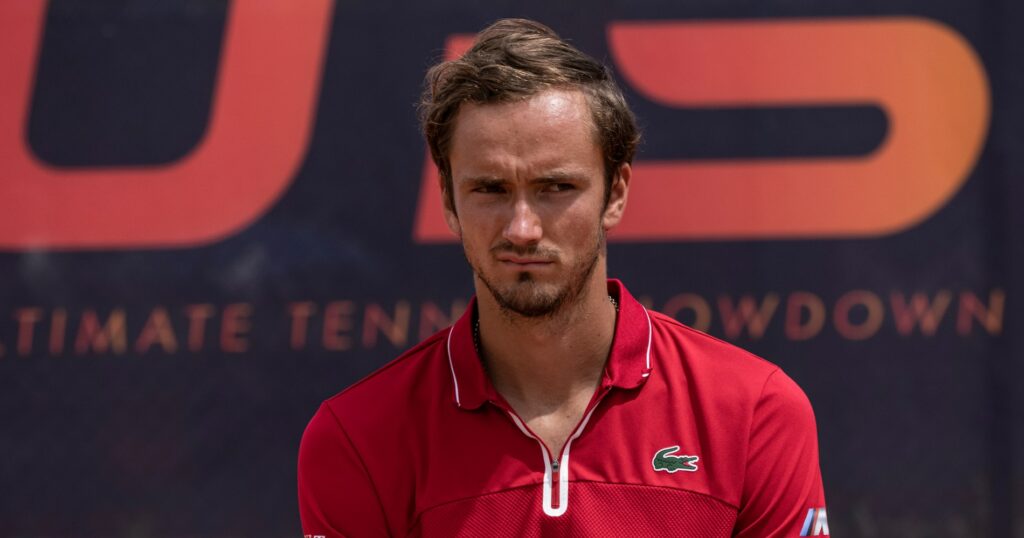
And a lot of other guys have a great level of tennis, and great personality. Fabio [Fognini], Corentin [Moutet], [Alexander] Bublik: you never know what to expect with them. Anything can happen. This is fun! Why do you think that whenever Fabio is playing, Benoit Paire is playing, Nick Kyrgios is playing, the courts are always packed? Because there is this excitement. Something crazy can happen anytime. A crazy shot, crazy behaviour and it’s fun. It cannot be only serious. It has to be serious, but has to be also exciting for other reasons than just two guys hitting a tennis ball, even though we love to see that.
We also wanted to touch on coaching too, in terms of what do the players think of it? Because it does divide opinion as well. Some love it, some hate it. But coaching at UTS is really an important part for you...
Yes, of course. Coaching is a big part of sports. If you look at all the sports, coaching is always a moment that is highlighted for several reasons. First of all, because you get to understand the tactics of the people. It’s so interesting. When you like sports, you want to understand what’s behind the strategies. Also, you get to know the players better because you see them interact in a moment of emotion. So it shows a lot who they really are. It’s a moment where you can lose control a little bit, in interactions. It is sometimes extremely emotional. You know for people, they say: ‘Wow, you hear a speech that is so good’ – it gives you excitement. Sometimes you have bad interactions, so it’s fun. It’s something that happens when there is coaching all the time. That’s why in sports it is so important, and that’s why most of the sports show it as a huge moment of their sports.
Tennis, for many reasons, and also because it’s very conservative, has been against it, except WTA, who has made a big step forward, I think, and we’ve had great moments of coaching, not always. One of the mistakes I think is that most of the coaching moments are in different languages, so nobody gets what they say. If it was always in English, I think we would have had much better moments of coaching.
So you said some players are against it? I don’t think many players are against it. I think many players are against the idea of it because they think, ‘Oh wow, I don’t know how much it’s gonna help me compared to others,’ and they’re always scared that others will have more than themselves. But they all have a coach, they all pay a coach, they all love to interact with their coach, so why wouldn’t they like to be coached during a match? Of course they like it, most of them like it by the way, and I will quote Rafa, who said that we pay coaches all year long to have them help us become better players. At the moment we need them the most they are not allowed to talk. It doesn’t make sense!
Players are struggling and fighting with the opponent, but also with themselves. They have two fights during every match.
Patrick Mouratoglou
We speak about those player-coach interactions and I see a lot of them where it’s ‘Relax: breathe’. Is there a specific thing you can say from a coach’s perspective that would really help a player during a match?
Yes, you’re right. You know there are two levels during a match. You don’t have a lot of time. In general you have 30 seconds, in UTS you have 20, even less because they don’t start coaching the second they finish the point. So you have to go straight to the point. It can be either a tactical thing that they don’t see that is obvious and would make a big difference. It can be a technical point, but it can be also an emotional thing, because we know how much the mental side of tennis is important. Players are struggling and fighting with the opponent, but also with themselves. They have two fights during every match. And if they don’t win the fight within themselves, they are not going to win the second one. The coaches can help the players with their own emotions and how they deal with them at certain moments.
And you know, I have sometimes in my career said, during a coaching moment on the court, the opposite of what I think in terms of tactics, because I knew that it would help their mental[ity]. For example, I should have asked them to be more aggressive, because that was obvious. But when I would sit down in front of my player and see her eyes with so much stress, I felt like if I tell her to be more aggressive in that moment of stress, it’s going to be even worse because I would bring more stress on, so I would say, ‘Relax, step back, take your time, play slower,’ even though I thought she should do the opposite. And because I said that, my player would relax and be much more aggressive, which is crazy if you think about it. I wanted to tell her to be more aggressive, I tell her to be less aggressive and thanks to that she became more aggressive. It is all mental.
Finally, from everything that’s been implemented, what are you most looking forward to?
I look forward to great coaching. I was very disappointed with the former format of coaching that we had at UTS because as the coaches had to hit the buzzer and they were like thrown in the middle of the arena. That’s how they felt. They were very scared and they were not doing it well, because they’re not used to doing that. On the WTA Tour they are, but not on ATP. They never do that. And I think that if they were able to coach between every point, they’re going to get used to it. And we’re going to start to have really great coaching moments. That’s what I expect.
And second, because I like to have incredible shots, I think that’s what people love the most in tennis, along with breaking racquets (smiles), this shorter net will be a great addition. Because we put the nets on the singles line, on the sides, it will give the players the opportunity to pass on the side of the net when they’re pushed on the sides, so we can have some incredible hot shots.



